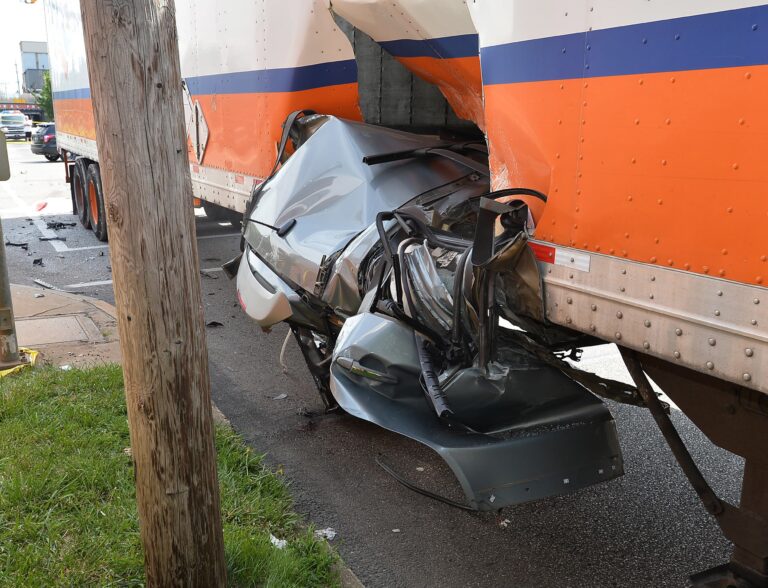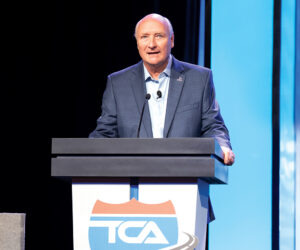WASHINGTON — Three Democratic representatives have introduced two pieces of legislation they say are critical to road safety.
Reps. Jesús “Chuy” García of Illinois, Hank Johnson of Georgia and Matt Cartwright of Pennsylvania joined the Truck Safety Coalition and truck crash victims at a press conference Wednesday to place in the hopper bills related to liability insurance minimums and braking equipment requirements on commercial motor vehicles.
García and Cartwright introduced the “Improving National Safety by Updating the Required Amount of Insurance Needed by Commercial Motor Vehicles per Event (INSURANCE) Act of 2019” which the two said would ensure minimum insurance requirements for motor carriers are periodically adjusted to the inflation rate of medical costs, as determined by the Bureau of Labor Statistics.
Minimum insurance requirement currently is $750,000 for most carriers. Others may face higher minimum based on the type of cargo carried.
The INSURANCE Act says according to the U.S. Bureau of Labor Statistics, the amount of $750,000, set in 1980 would have the same purchasing power as $4,923,153.29 in 2019, if the amount was raised to account for medical-cost inflation.
Therefore, the INSURANCE Act would set the minimum at $4,923,154 and require the Secretary of Transportation, in consultation with the Bureau of Labor Statistics to adjust the minimum every five years for inflation relating to medical care.
Most carriers purchase the $750,000 per event minimum, some carry $1 million.
A previous proposal to raise the minimum did not materialize.
On its November 28, 2014, the Federal Motor Carrier Safety Administration published an advance notice of proposed rulemaking (ANPRM) concerning financial responsibility (translated liability insurance minimums) for motor carriers, freight forwarders, and brokers.
FMCSA sought public comment on whether to exercise its discretion to increase the minimum levels of financial responsibility, and, if so, to what levels. After reviewing all public comments to the ANPRM, FMCSA determined that it has insufficient data or information to support moving forward with a rulemaking proposal, at this time and on June 5, 2017, withdrew the proposal.
Sources tell The Trucker the INSURANCE Act will never make it out of the Subcommittee on Highways and Transit to which it was referred.
“Thousands of families are suffering in silence, saddled with crippling medical care costs resulting from catastrophic crashes,” García said. “The inadequacy of the current minimum insurance requirement, left unchanged for 40 years, only further prolongs the suffering and financial strain on families that have already lost so much. The INSURANCE Act ensures that families are adequately compensated to cope with their losses and prevents taxpayers from footing the bill for negligent trucking businesses and drivers.”
Cartwright said with trucks getting bigger and highways becoming more crowded, the country has experienced too many horrific truck accidents that change Americans’ lives forever.
“And since the minimum liability insurance for trucks hasn’t changed in nearly four decades, we’ve seen how victims, their families, hospitals, and our strained social safety net are forced to foot the bill for irresponsible driving,” he said. “This bill will raise that minimum, providing necessary relief to surviving victims and to the families whose lives are shattered by a truck accident.”
García and Johnson also introduced the Safe Roads Act, which would require automatic emergency braking (AEB) technology to become standard features commercial motor vehicles.
“Automatic braking systems are a simple, common-sense solution to deploy proven crash-avoidance technologies,” Garcia said. “Rep. Johnson and I agree that we should always operate on a safety-first basis. Any further delays to implement this important, life-saving technology will only result in more preventable, tragic deaths and catastrophic injuries. We shouldn’t be in the business of putting a price tag on life – passing the Safe Roads Act is simply the right thing to do.”
“Tragically, the simple installation of automatic braking systems on all commercial motor vehicles – a $500 safety feature – might have prevented these deaths and countless others across the country,” Johnson said. “America’s roads and highways should be safe for all drivers. Taking full advantage of technologies that are available and proven to anticipate and prevent crashes will save lives.”
The bill was also referred to the Subcommittee on Highways and Transit.
Both the Safe Roads Act and the INSURANCE Act are endorsed by the Truck Safety Coalition and the INSURANCE Act has the additional endorsement from the American Association for Justice, the bills’ sponsors said.
Lyndon Finney’s publishing career spans over 55 years beginning with a reporter position with the Southwest Times Record in Fort Smith, Arkansas, in 1965. Since then he’s been a newspaper editor at the Southwest Times Record, served five years as assistant managing editor of the Arkansas Democrat-Gazette in Little Rock and from November 2004 through December 2019 served as editor of The Trucker. Between newspaper jobs he spent 14 years as director of communications at Baptist Health, Arkansas’ largest healthcare system. In addition to his publishing career he served for 46 years as organist at Little Rock’s largest Baptist church.









As a driver of over 20 years, I agree that insurancehave should have more coverage for accidents, especially due to higher medical care costs. One another subject,truck drivers should get full social benefits at age 62, their spouse should get 80% too at age 62, even if she/he is older than their spouse. Truck driving is dangerous, careless drivers, drunks, crazies, doing dangerous things on the road.
If, that driver has worked 20 years or more,he/she should have the right to retire in full at age 62. They deal daily with weather hazards, un-safe truck parking areas, thieves, unhealthy work conditions ie: robbers, not being able to excercize, heart conditions,diabetes, high blood pressure, sleep apnea, stress of being on time with their load,and of missing g weddings, graduations, funerals, and missing out on life while being on the road. truck drivers are often found dead in their trucks from heart problems, stroke, and other “natural causes”, but life insurance on truck drivers only covers accidents, not natural causes, and that needs to change too,insurance should cover both,and just high stress levels. Not all drivers will do this, but some will.
I want to see a bill that mandates that social security, will be given at age 62 to all truck drivers, not covered by a company pension,(having an IRA or 401k won’t count as a pension, because it isn’t).
Automation is coming to replace drivers, foreign drivers are coming in and truck drivers deserve a good retirement, closer to $3,000 a month for themselves at retirment age 62 or older. Maybe if, getting all of their social security benefits at age 62 or 63, will prompt more people to go into truck driving and stay 20 years. There was no truck driver shortage when drivers had pensions or could qualify social security at age 62 at 80% or higher. To get people to go into trucking and stay for years, they need incentive, and sign-on bonuses will not do it! That is just a gimmick, it is insulting to most truck driver,you don’t the lump sum because taxes on lump sum bonuses will eat it up. It is paid out as “miles” over a few years, and that is bull puckey. Let’s get going on passing a bill like this, that bill allowing truck drivers with 20 plus driving years to retire at full benefits at age 62, needs to cover all drivers, who have 20 years or more worked as a Truck driver now.
Transport Insurance Amarillo
http://thetwiagency.com/
Insurance is one of those things that people tend to parcel out to get the best prices, but you can find the best insurance coverage for your needs right here! The TWI Agency will help you to find the best policy for a price that fits your budget, so there’s no need to go back and forth between providers. Our knowledgeable agents will find the right business, home, life and auto insurance for you, saving you the time and money involved with finding the right coverage.